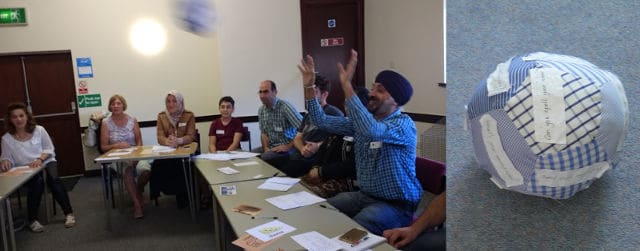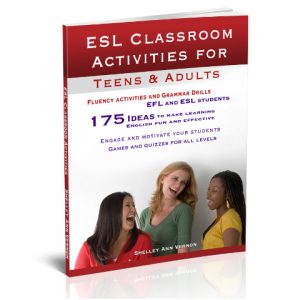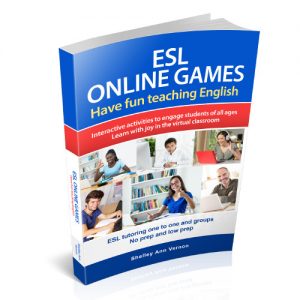Anyone teaching English to refugees or taking culturally diverse classes will tell you to be thoughtful.
Unexpected emotions
Refugees may be feeling vulnerable, shy, and fragile. A simple question such as “Where are you from?” may result in floods of tears. There may also be tensions between students with cultural differences and backgrounds. There may be enemies from two sides of a war present. Using non-competitive games can help relax the atmosphere and create a friendly classroom.
Dangerous territory
Unit 1 from any workbook typically includes “Talking about yourself” but this can be dangerous territory. Stick to structured questions and answers rather than general chat. Allow students to communicate within safe boundaries. The game Good Evening Beach Ball is a great example. When students catch the ball, they answer the question or read the phrase to which their thumbs are pointing. Then they throw the ball to someone else. There is no pressure, and throwing a ball brings back the innocent fun of childhood play. You can see students playing this game in this post’s picture.
Why not teach students about the new host country? This knowledge will help them integrate. Everything is of interest, from geography (cities, states, rivers, etc.) to key historical figures and famous musicians, fashion designers, architects, artists, culinary specialties, and so on. Talking about neutral facts will help avoid conflict. Religion, politics, and probably relationships are off the agenda! Have students research and invent questions for the next class. Collect all the questions and make your own Trivial Pursuit game, just for your specific classroom. Play in teams, not as individuals, as this avoids one poor student being last!
Higher level students
You might consider teaching through a novel for higher-level students, but perhaps choose something light-hearted. In addition, reading poetry is an uplifting way to study language, and I recommend the Puffin books of children’s poetry – for the adults! Children’s poetry is easier to understand (less cryptic) and often light-hearted and amusing.
Great resources for teaching English to refugees
For plenty of ideas do get my book of activities for teens and adults. (And here in paperback or from your local bookstore.) I also have plenty of resources for teaching children. Feel free to drop me a line and ask for some free samples.
For a more detailed look at teaching English to refugees, please see this details post on how games help difficult classroom situations.
-
Sale Product on sale
 Games and Activities for Teens and Adults
Games and Activities for Teens and Adults€19.97Original price was: €19.97.€15.33Current price is: €15.33.Rated 5.00 out of 5 based on 12 customer ratings -
 ESL Online Games€19.97Rated 5.00 out of 5 based on 4 customer ratings
ESL Online Games€19.97Rated 5.00 out of 5 based on 4 customer ratings



5 thoughts on “Teaching English to refugees”
I have a strong command in english, I would like to teach those who are interested in the most spoken languague in the world.
regards, Catherine
Dear Catherine, Hello there. You are sure to find a job teaching English somewhere, there is such a need for it. If you do not have any kind of teaching qualification then you could consider doing a short course to learn some basics. A TEFL (TESOL or other acronym) course can be as short as four weeks, and that is enough to get your foot in the door and start teaching. All the best, Shelley Ann Vernon
Hello again Shelley,Nice to see my old photos still there with my lovely students. Several have moved on now, but I was online giving an English lesson to one of this group this very morning as she and her husband are still with me. The old ball has seen a LOT of use; with vocab changing with every new topic. You are a fount of such good ideas. Keep going! Keep safe,
Noreen
Dear Noreen,
Thank you again for letting me use your lovely pics, nice to have genuine pics. I’m glad all is still going along well for you.
All the best
Shelley
Christine Dobinson commented: Thank you so much for bringing to my attention that some of my innocent questions could be so insensitive and stir up insecurities and unhappiness.